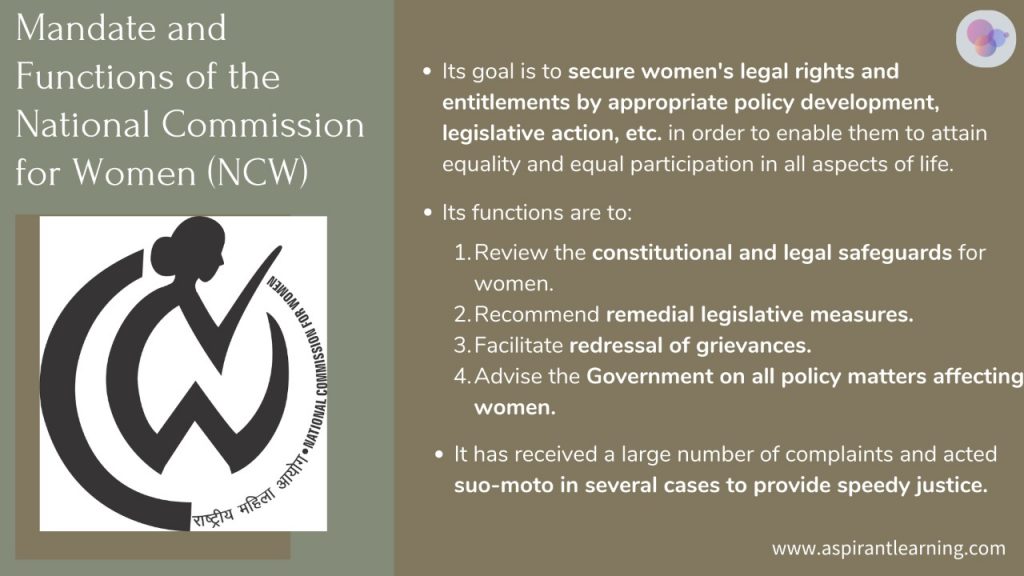News Highlight
National Commission for Women (NCW): authorities are also directed to conduct awareness programmes on sexual harassment.
Key Takeaway
- The National Commission for Women (NCW) has asked all States to ensure strict implementation of the sexual harassment at workplace law by coaching centres and educational institutes.
- Expressing concern over incidents of sexual harassment at coaching centres, the NCW has written to the chief secretaries of all States.
- It is to direct authorities to ensure strict implementation of the Sexual Harassment of Women at Workplace (Prevention, Prohibition and Redressal) Act, 2013 and guidelines established thereunder.
National Commission for Women (NCW)
- About
- The NCW is the official organisation tasked with advising the government on all policy issues that impact women.
- Under the National Commission for Women Act of 1990’s definitions, it was established on January 31, 1992.
- In addition, the commission comprises a chairperson, a member secretary, and five other members.
- Furthermore, the Central Government designates the NCW’s chairperson.
- Constitutional provision
- The Indian Constitution doesn’t contain any intended provisions to favour women intrinsically.
- Article 15(3), Articles 14 and Article 21 protect and safeguard women.
- In addition, they are more gender-neutral.
- Objectives
- Firstly, the NCW’s goal is to speak up for Indian women’s rights and to give them a platform for their problems and difficulties.
- Furthermore, dowry, politics, religion, equitable representation for women in the workforce, and the exploitation of women for labour have all been topics of their campaigns.

The Sexual Harassment of Women at Workplace Act, 2013
- Background
- The Supreme Court issued the Vishakha Guidelines in 1997 (in Vishakha and others v/s The State of Rajasthan) to develop a framework for workplace sexual misconduct redress and grievance proceedings.
- In addition, the Act of 2013 was motivated by these guidelines.
- Objective
- Its objective is to protect women’s rights at work and create a safe environment.
- Furthermore, it also provides a platform for both preventing and solving issues.
- Provisions of the Act
- Firstly, it applies to all industries, both organised and unorganised.
- It describes a workplace as an expanded space that includes every location an employee goes to while performing work-related duties, such as a place of transportation.
- Additionally, any company or organisation with more than 10 workers must set up an internal complaint committee (ICC) to investigate and respond to claims of sexual harassment.
- Furthermore, each district has a local complaints committee with at most ten employees.
- Penalties: If an employer violates the rules, a Rs. 50,000 fine may be assessed, and the licence may be suspended.
Conclusion
- If public knowledge, sensitivity, and effective execution are ensured, a law as groundbreaking as Sexual Harassment of Women in the Workplace will have significant social repercussions.
Pic Courtesy: The Hindu
Content Source: The Hindu



